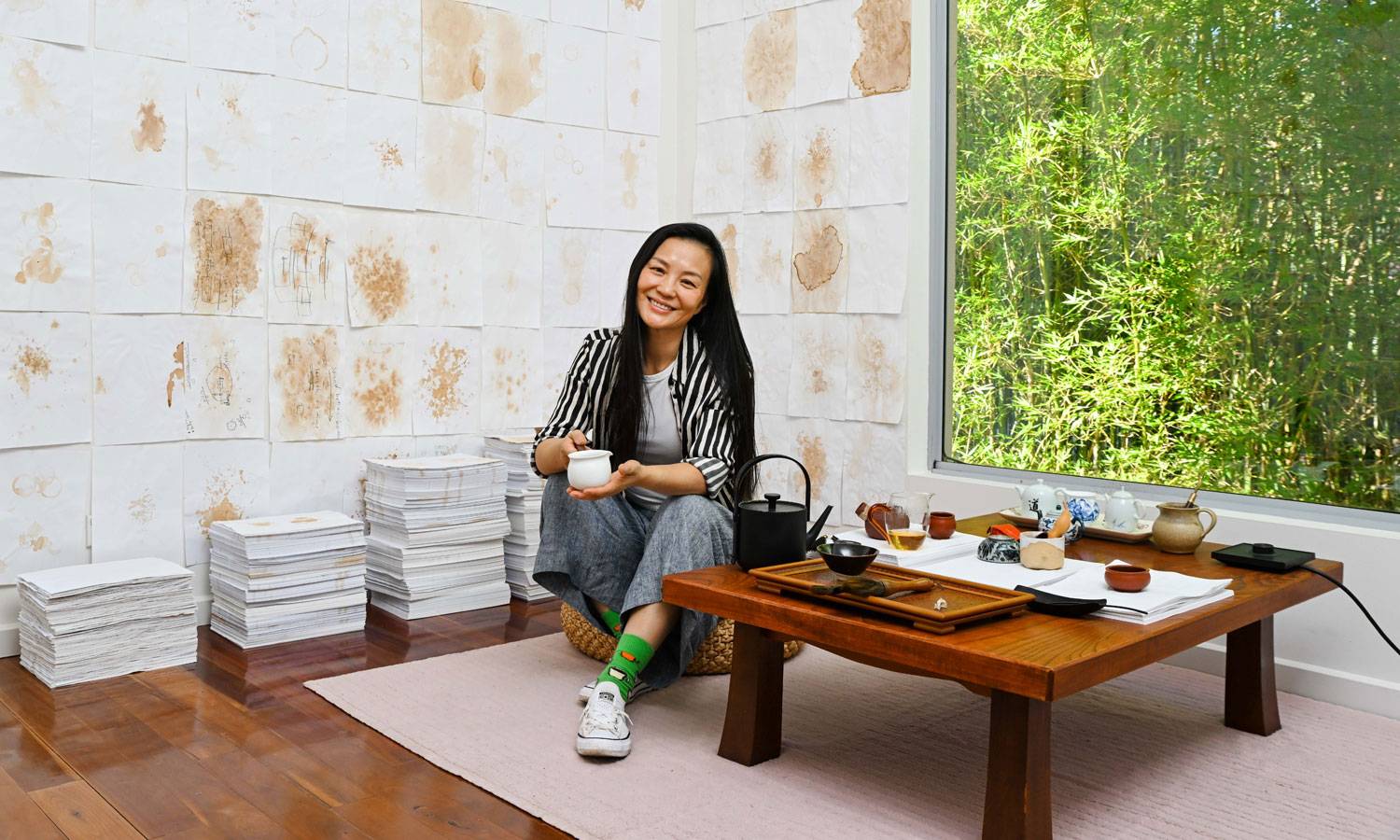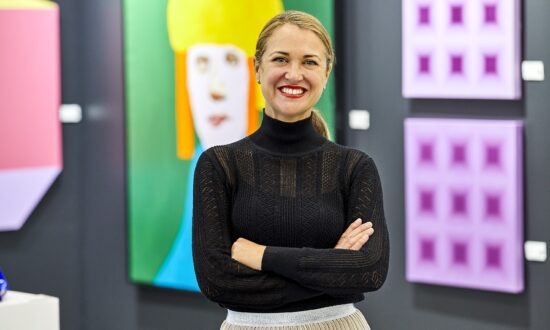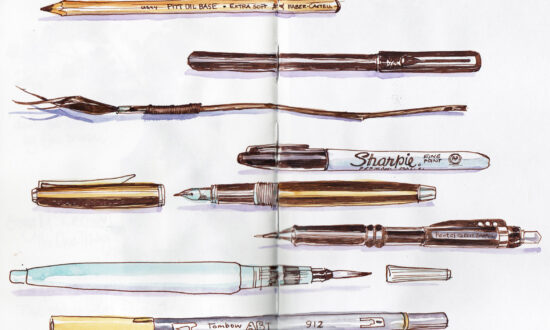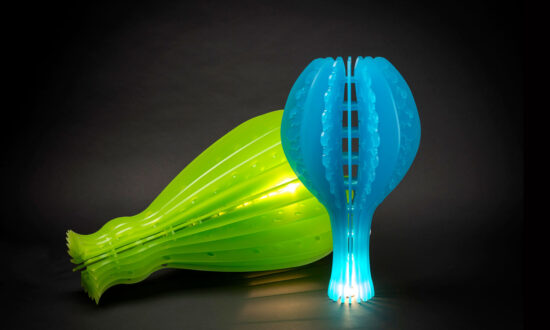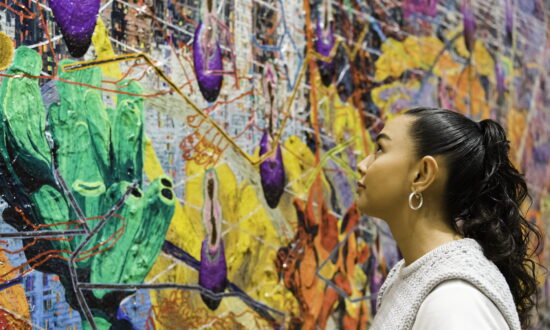When it comes to the story of Jingwei Bu, tea is perhaps the best place to begin.
Bu, a multi-disciplinary Adelaide artist who works with everything from drawing to installations, makes tea for every one of her visitors.
“I love this human connection,” she says, as we sit across from each other at a Chinese kang table. “This is truly beautiful.”
She brews white tea and serves Chinese dried dates and corn crackers, which, she explains, are made from Australian corn.
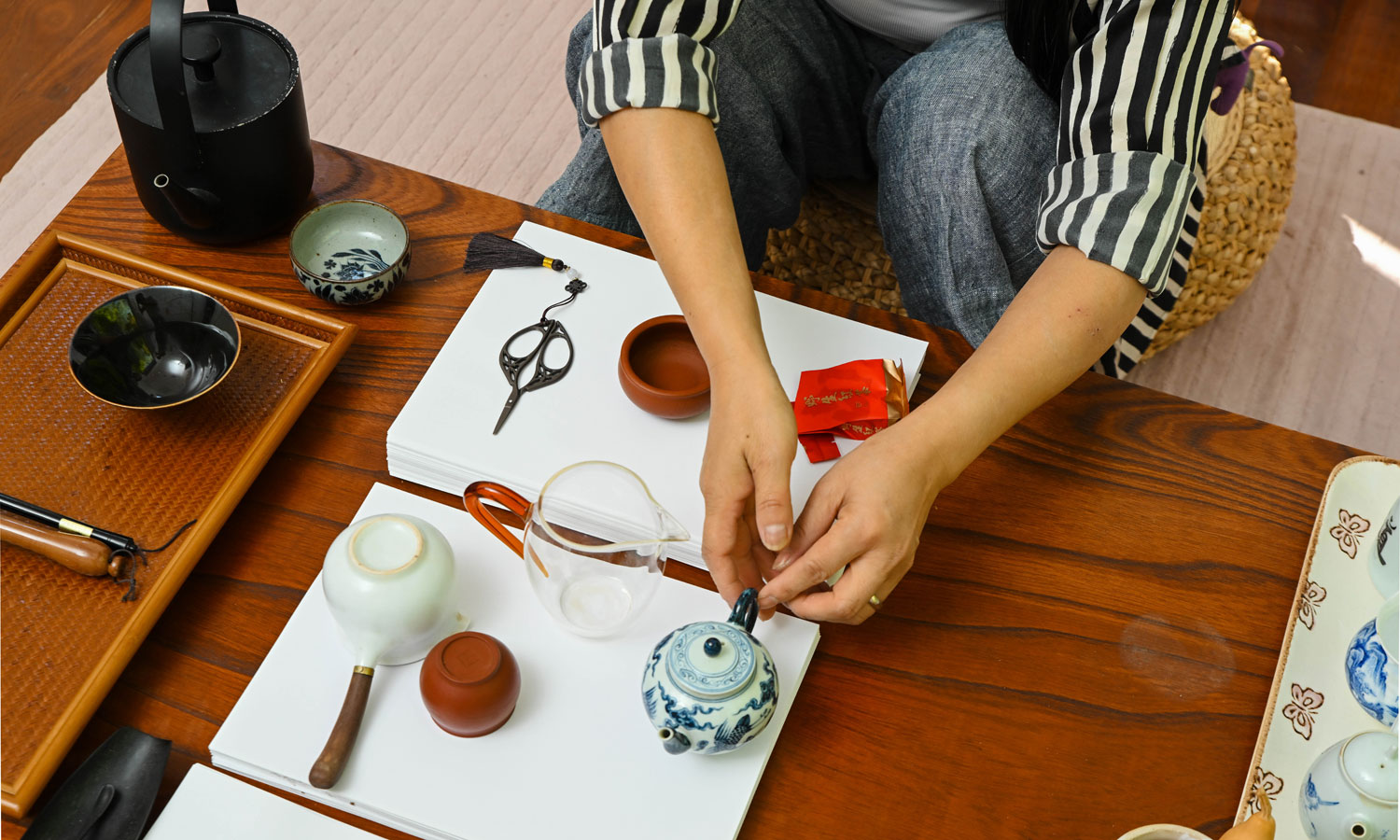
Tea is integral to Jingwei Bu’s arts practice. Photo: Jack Fenby
The room we’re in is next to an open-plan studio that houses endless materials and a large piano. This tearoom, however, is as much of a creative space as the studio, as the walls are decorated with tea-stained pieces of paper.
The papers were collected during a three-month residency at Nexus Arts in 2021, titled Pouring Tea Until It Is All Evaporated. For the residency, Bu hosted daily tea ceremonies with audience members.
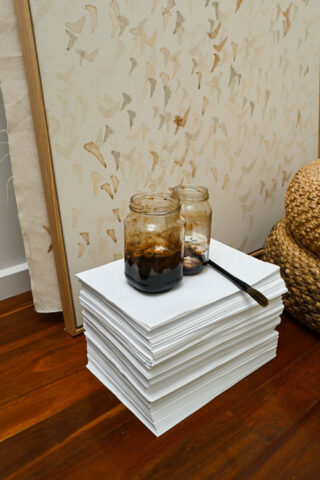
Buddhist Chen philosophy is a stimulus for Bu’s work. Photo: Jack Fenby
“I use white paper as a mat [under the teacups] and it carries the memories,” she explains of the practice which she continues now, serving tea in a cup on a stack of white paper.
“Paper has been always comfortable because it’s in my heart, in my flesh.
“I grew up in the paper country – Chinese people invented paper! For me, it carries the energy and the time we spend together.”
The act of pouring tea is extracted from the Buddhist Chan teaching about letting go of one’s obstinate intention.
Bu was a finalist in the emerging artists’ category of the SA Museum’s 2024 Waterhouse Natural Science Art Prize with a “tea calligraphy” piece titled Water # 3 which features repetitive shapes painted on a canvas with tea water.
“It’s culture, blending,” she explains.
“The canvas is Western art material, obviously. The tea water is Chinese oriental art elements.”
Buddhist Chen philosophy is an ongoing stimulus for Bu’s work. She is currently exploring the teaching that individuals go through several cycles of birth, living, death and rebirth. This is something the artist encountered herself during two life-threatening birth experiences with her children. She has drawn from it for her upcoming performance work Bloody Ink Play.
“It’s not only about the experience of birth, the pain and the struggle, or the experience of dying and becoming alive again,” she says.
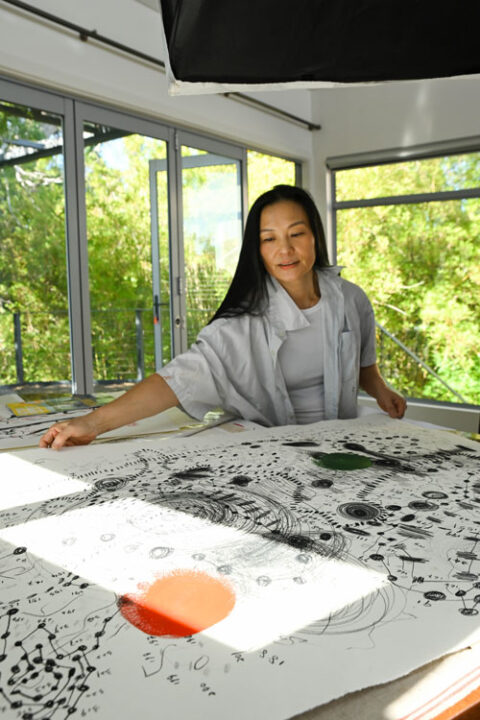
Jingwei Bu in her light-filled studio. Photo: Jack Fenby
“It’s about how I gather my strength to move on and to get healthier again. It’s about how weak I was, and fragile inside and outside, physically, mentally.
“After giving to the newborns, everything’s gone. Where I am? I don’t know. Who I am? I don’t know.”
The work features a big ink pot, and Bu – wearing a white dress – will be dipped into the ink.
“It will be in slow motion, and you can hear that blood, the black blood, the ink water, go from the dress on to the leg to the feet to the pot.
“You can hear this beautiful drip.”
Bloody Ink Play – which features live music by Emily Tulloch – is part of Adelaide Festival Centre’s inSPACE Program and will have a work-in-progress showing on May 9. An earlier iteration was performed in Sydney in 2022, and Bu envisions that it will be developed even further to feature more elements that show the light and shade of life in greater depth.
“It will be the cheerfulness of life. The triumph of being alive, and celebrating everything: the pain, the struggle, the effort, and the joy, the simple joy… the achievement. Everything is part of life.”
Alongside the development of Bloody Ink Play, Bu is also completing a Guildhouse Catapult Mentorship with renowned Australian painter and sculptor Lindy Lee, whose 6m-high sculpture The Life of Stars graces the entrance to the Art Gallery of South Australia.
Bu has just spent a week living with Lee, whose work blends the cultures of Australia and her ancestral China and explores her Buddhist faith.
“She invited me to stay in her [Byron Bay] studio,” Bu recounts.
“I basically became part of her life. I stayed in the bedroom opposite her bedroom. She never shut the door.
“The gesture of the invitation to her life, without any knowledge or context apart from a couple of Zoom meetings, already tells us everything about we need to know about Lindy.”
Bu is now in the process of developing a project in direct response to this encounter with Lee, exploring the themes of Chinese immigration, femininity and motherhood. While this project is still in its early days, she hopes it will be a moving image piece featuring Lee.
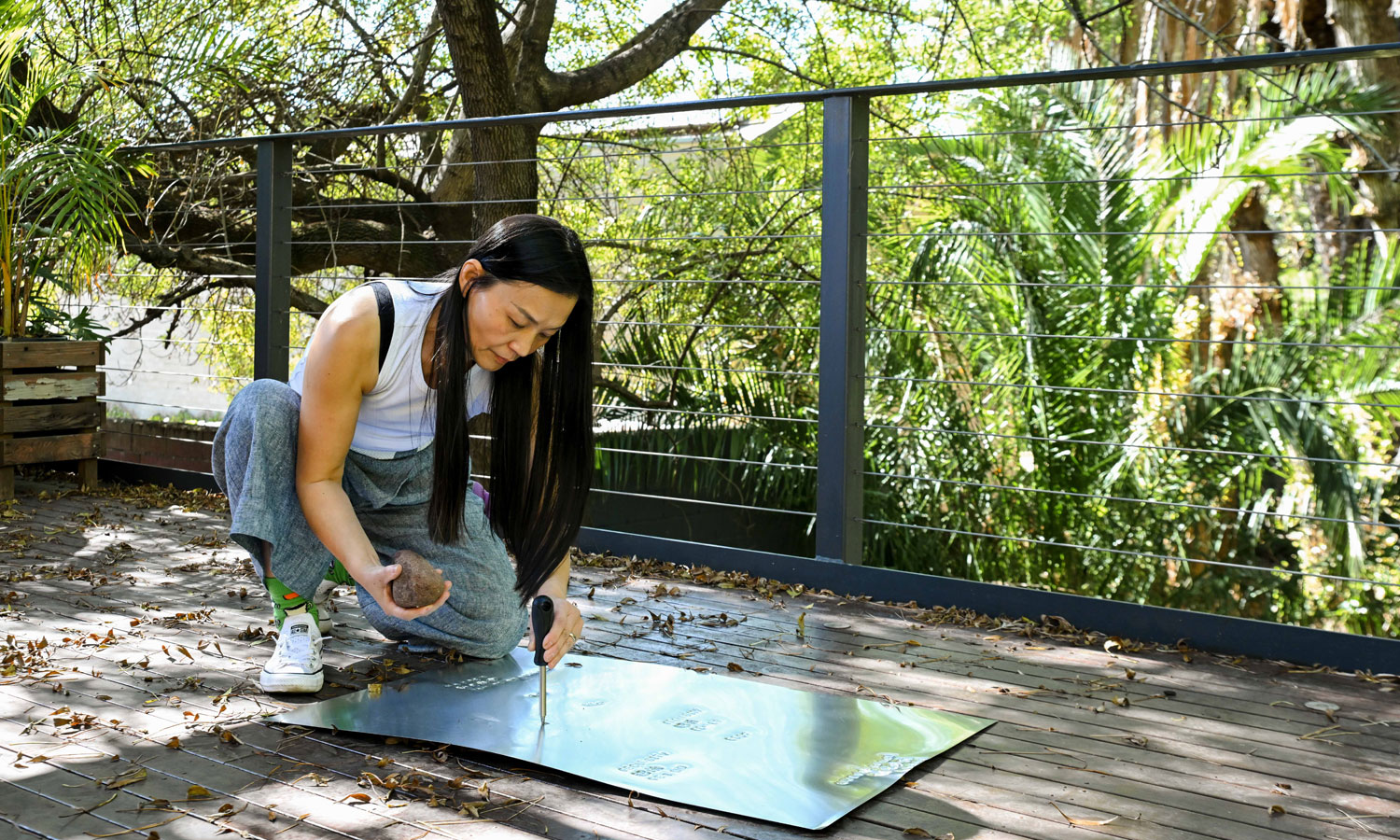
Jingwei Bu says she is ‘going from being a paper person to a metal person’. Photo: Jack Fenby
The mentorship has also encouraged Bu to play with the new medium of aluminium, in an effort to uncover a new way of exploring the idea of time and permanence.
“I think it’s a big step from what I’m doing in terms of the material,” she says.
“I’m going from being a paper person to a metal person! And from the gentleness of a very Zen experience of sharing tea, the performance of pouring, and the impermanence of these water concepts, to the kind of permanent material and statement of mental.

Get InReview in your inbox – free each Saturday. Local arts and culture – covered.
Thanks for signing up to the InReview newsletter.
“If you punch or dent aluminium, it takes the memory of what’s happening, and we’ll never take it back.”
Exploring the possibility of permanence is, after all, what collecting the tea-stained piece of paper was all about.
“The tea stains will be faded in probably 200 years,” she says. “It reminds me my life is short and impermanent.”
Read more about Jingwei Bu and her practice on her website. Her work Water # 3 can currently be seen in the Waterhouse Natural Science Art Prize exhibiton at the SA Museum. Bloody Ink Play will have a work-in-progress showing on May 9 the Drama Centre Rehearsal Room at Adelaide Festival Centre.
In the Studio is a regular series presented by InReview in partnership with not-for-profit organisation Guildhouse (read our previous stories here). Guildhouse’s Catapult mentorships are supported by donations from its Creative Champions. Jingwei Bu was also part of the Art Works artist and writer-in-residence in the program in 2022, collaborating with writer Eleen Deprez.
Support local arts journalism
Your support will help us continue the important work of InReview in publishing free professional journalism that celebrates, interrogates and amplifies arts and culture in South Australia.
Donate Here
